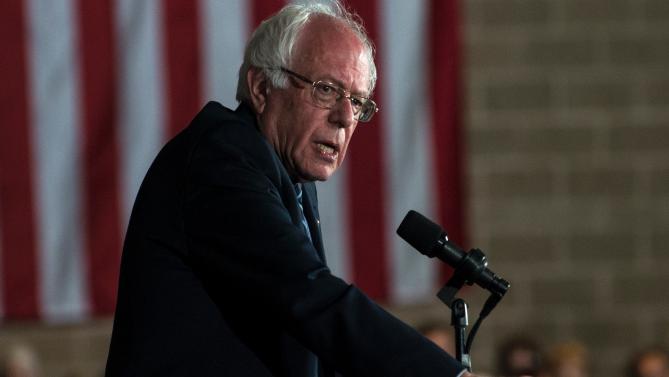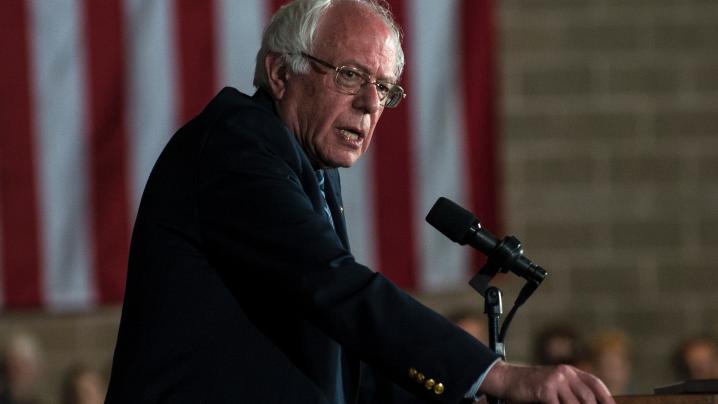[ad_1]

Democratic presidential candidate Sen. Bernie Sanders (D-VT) speaks to a crowd of supporters at the Mayo Civic Center on February 27, 2016 in Rochester, MN.
Stephen Maturen/Getty Images
Bernie Sanders needs more people. Preferably African American people who live in the South.
But after being routed by Hillary Clinton in South Carolina, it looks like the numbers aren’t on his side. Sanders lost the African American vote to Clinton by an incredible 86 percent to 14 percent. To put this in context, he did worse than Hillary Clinton did with black voters in 2008 (19 percent), and he did worse than John Edwards (36 percent), John Kerry (32 percent) and even Rev. Al Sharpton (19 percent) in the 2004 Democratic primary. The last time a Democratic candidate got beaten that bad amongst black voters in South Carolina and still went on to win the nomination was Michael Dukakis way back in 1988, back when South Carolina held a caucus and not a primary.
A Sanders win in the Palmetto State was always a long shot. Every poll predicted that Clinton would beat Sanders, but there was some hope of him putting a dent into Clinton’s stronghold on the black vote. But that hope was dashed when she administered a political beat down so bloody that Ryan Coogler would’ve left it on the cutting room floor. As of publication, with over 98 percent of South Carolina precincts reporting, Clinton is steamrolling Sanders 74 percent to 26 percent and will win the majority of the delegates. The questions now are: What can Senator Sanders due to survive his third degree “Berns”?
The Sanders campaign has always banked on getting young voters out to the polls, and increasing turnout as a way to counter Clinton’s 20 plus year relationships in several primary states. That didn’t happen in the 2016 South Carolina primary and actually hasn’t been happening across the board during the Democratic contests thus far. The turnout amongst Democrats in South Carolina was 359,066 in 2016, certainly higher than turnout in 2004 but nowhere close to the tsunami of support that occurred in 2008, where turnout reached 532,469 voters. If Sanders has any chance of competing across the remaining Southern States he’s got to get higher turnout, and especially amongst African American voters. This is actually a lesson for both candidates, because on the Republican side turnout in South Carolina jumped from 445,677 in 2008 to 737,924 in 2016.
| SC Democratic Primary 2016 | Total | Percentage |
|---|---|---|
| Hillary Clinton | 234,396 | 74.13% |
| Bernie Sanders | 80,044 | 25.31% |
| SC Democratic Primary 2008 | Total | Percentage |
|---|---|---|
| Barack Obama | 294,898 | 55.42% |
| Hillary Clinton | 140,990 | 26.49% |
African American turnout is the engine the drives the Democratic party in national elections and thus the candidate with the best chance of attracting and turning out African American voters is the Democrats best chance to win the White House again. The African American vote increased not only as a percentage of the electorate but African American women voted at a higher percentage than any other Demographic group in 2008 and 2012. This breaks down to about 2 million more voters across America and the difference between Ohio, Florida and Virginia flipping from Romney to Obama.
Sanders visited historically black colleges. He campaigned with director Spike Lee, rapper Killer Mik, and Prof. Cornell West. He even diversified his campaign team. Meanwhile for almost two weeks Clinton was battered with viral stories about her policy choices in the 90s, questionable use of racialized terminology and her overall fitness as a candidate. Yet, African American voters emphatically voted for her over Sanders.
Why? Because over 70 percent of South Carolina Democratic primary voters (61 percent of whom are African American) want a president to continue President Obama’s policies. Over the last several months Hillary Clinton has been hugging Obama so tight that Michelle is giving her side-eye. Bernie Sanders, on the other hand, has consistently said he wants to move further left than Obama’s policies, something only 19 percent of South Carolina voters supported.
At the core, the Sanders campaign did an excellent job of reaching out to African American voters. They just didn’t like what he had to say. His focus on economic justice resonates, but clearly African American voters don’t believe that he can accomplish his goals, and further, as many have argued, he seems new to, or only recently interested in the fate of African American voters. Is this fixable? Possibly. The Sanders campaign will have to be careful that white liberal supporters don’t continue to alienate black voters with suggestions that “They don’t know what’s good for them” and further he’ll have to remember that demonstrating policy is just as important as talking about it.
Sanders and Clinton are being vetted by black voters harder than any Democratic candidate since the 1960s (and that includes Obama) so showing up four months out with a few out-of-state endorsements wasn’t enough for Sanders to break through.
Republican front-runner Donald Trump has already started to move on from attacking (or really pummeling) rivals like Sens. Marco Rubio and Ted Cruz to focus on Clinton. Saturday night after a sound beating of Sanders, Clinton pivoted to general election rhetoric, calling out Trump by his slogan and gearing up for battle. With Saturday’s results, it’s not a matter of if Bernie Sanders will drop out of the race, it’s a matter of when. Sanders has decreased in his share of the vote in every single category: whites, women, young people, African Americans and every other Demographic group from the Nevada caucus to South Carolina. If he doesn’t win several of the 12 Super Tuesday states, or at least stay within a reasonable delegate margin by keeping Clinton from running up the score, this race may have all but ended in the Palmetto state.
[ad_2]






















